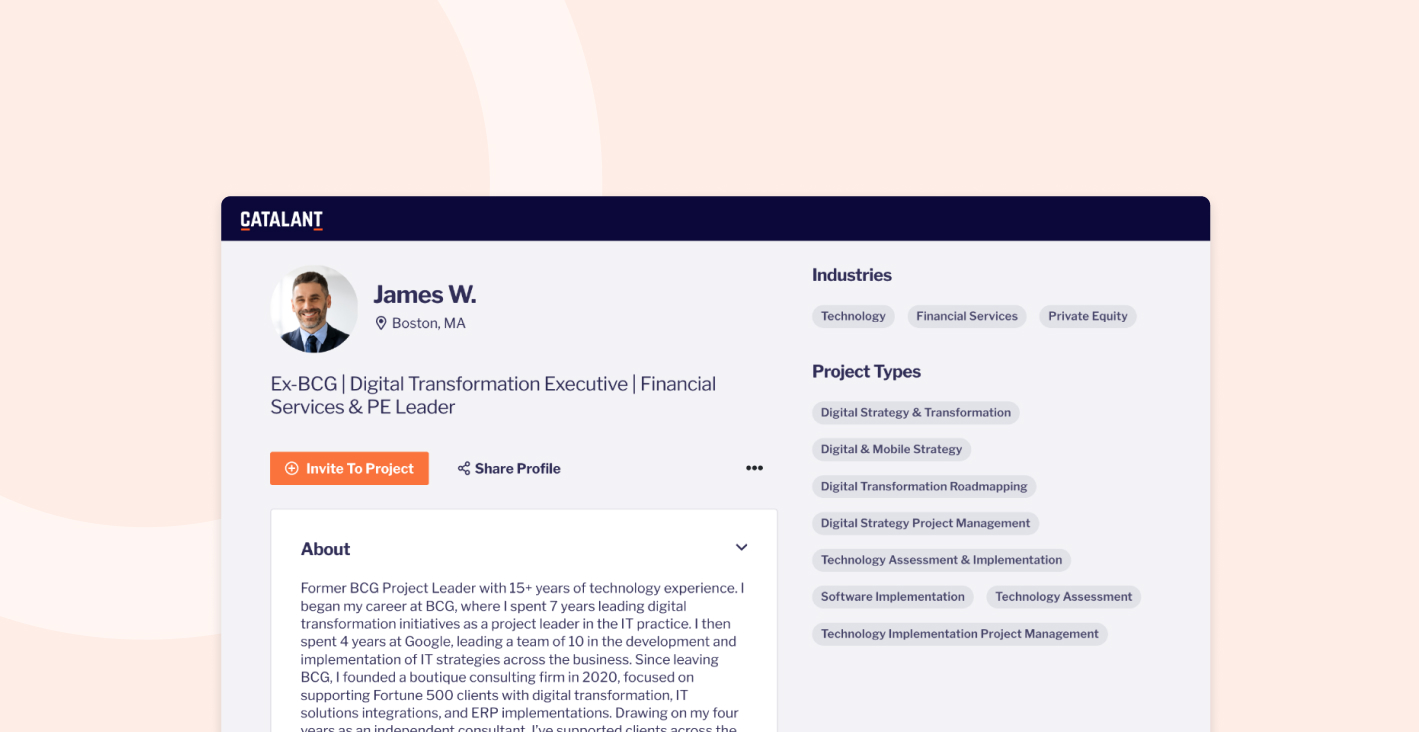Growing Your Practice
How to Grow Your Independent Consulting Practice into a Boutique Consultancy
How to Grow Your Independent Consulting Practice into a Boutique Consultancy

Any consultant serious about building her business will one day come across an enticing project that is just a little too large, complex, or outside the boundaries of her existing knowledge. Rather than causing overwhelm or discouragement, it should inspire excitement — because within is the possibility of substantial career advancement and all its benefits.
Pursuing a big project can be straightforward to manage if it is a one-off occurrence. However, it is non-trivial to shift permanently from being a solo practitioner to managing a team of consultants full-time. Thinking strategically about the trajectory of your practice early and often will pay dividends far into the future.
Grow Your Independent Consulting Practice
When it comes to growing your consulting business, there are two main approaches to scaling: horizontal and vertical.
The former involves broadening your capabilities and offering services in adjacent areas. This approach can help you target and serve a broader range of clients. As an example, a change management consultant might choose to expand her team to include experts specifically focused on technology or process improvement.
Vertical scaling, in contrast, involves focusing on your niche offering and growing the volume of projects you complete in that area. This approach can help you rapidly become a recognized expert in your field and build a loyal client base.
In the case of RRDS Chicago, we utilized a hybrid approach, focusing on solving tough data science challenges specifically within industrials firms but building a roster of consultants with specialized expertise in sub-classes of machine learning and AI problems (e.g. NLP, OCR, forecasting, predictive maintenance, optimal data enrichment, etc.).
Of course, these approaches have advantages and disadvantages. The right choice will depend on your business goals and niche. Early in the process, it is worth considering the field of competition you face to determine what path will best enable you to grow your business on your terms.
Click here to learn how to collaborate with Catalant on content and thought leadership.
Have a Plan
Once you have identified how you want to scale your business and what kinds of projects you want to target, it is time to develop a plan.
Here are some key considerations you will want to consider:
1. Look before you leap!
It is important to have a clear vision of what you want your business to be and how you plan to get there. Of course, include the elements of a typical business plan. But also consider an action plan for transitioning your role from delivering work to being more focused on business development and project management.
An important reminder prior to scaling your practice — be sure to review your terms with clients to see if you need to obtain any approvals. For example, some clients require approval before you subcontract any project work or incur expenses related to added resources.
2. Identify your value proposition.
This one is important for clients as well as for the recruitment of consultant partners — and it likely will look different for these two audiences.
In a competitive hiring market, people often ask, how have you attracted and kept such great people at RRDS Chicago? Simple. I pitch consultants on all the things I love about the independent consulting model and working through Catalant: the flexibility of remote work, the promise of a stream of interesting problems with room to grow, and more autonomy over how and when I work.
I also sell the value of having RRDS Chicago manage projects, which comes with the benefit of:
- Freedom from the necessary but sometimes tedious work of client management
- An end to the constant worry about selling
- Always prompt payment for work delivered
Finally, I share my passion for building a great culture among team members. Brilliant and congenial folks wanted – no jerks allowed! This approach has aided in long-term recruitment and retention.
For clients, your value proposition will be more standard. Maybe everyone on your team trained at Big Three firms and you can offer senior expertise in your niche at a fraction of the cost.
Whatever it is, identifying your value proposition will help you stand out in a crowded market and attract the right clients and team members.
3. Aim to be ever-profitable.
Within your growth plan, you will want a keen focus on your practice’s finances. Consulting can feel like feast or famine, so you want your cost model to be dynamic and responsive to the inevitable dry spells. In our case, we decided on a 1099 policy for all consultants so that we kept our fixed costs low but could scale and contract as needed.
From time to time, you will want to analyze your rates and margins. Platforms like Catalant offer clients access to outstanding talent, often at highly competitive rates. To continue to win projects as you add new consultants you have to strike a balance: to be compensated for the project management you’re doing but to continue to offer clients phenomenal value even as your team grows. By increasing the volume of projects your team accepts, you can mitigate some of these challenges. But pricing can complicate the pitching process, particularly for fixed-bid projects.
From a practical perspective, understand that managing cash flow can be a huge stumbling block at this stage of development. Best practices here include:
- As much as possible, try to align the terms of when you get paid and when you pay your consultant partners.
- Aim to build a cash buffer early so that you have the resources to pitch larger projects without worrying about how you will pay your team promptly.
- Reach out to your business banker to get or increase a line of credit, which can be used as a short-term source of funds as you develop your business.
Over the years, I have had many difficult conversations with long-term clients about RRDS Chicago’s ability to continue to provide services under unduly long payment terms. Most large enterprises are sympathetic to the cash flow demands of small suppliers. But sometimes it’s not enough.
In one extreme case, we went to a factoring firm to sell some of our forward book of business to enable us to work on a major new project. Generally, this is an expensive mode of financing and one I recommend only as a last resort.
How to Find Other Independent Consultants Who Will Help You Take on More Work
Now that we have touched on some considerations for the plan to scale your business, let’s dive specifically into how to build your team of consulting partners. Here are a few things to consider.
1. Leverage your networks.
One of the easiest ways to find other independent consultants is to tap into your existing networks. Reach out to former colleagues, classmates, and industry contacts to see if they know anyone who might be a good fit for your projects. You can also use social media platforms like LinkedIn to expand your network and connect with other professionals in your field.
2. Use your alumni connections.
If you’re looking for junior staff, consider returning to your alma mater. Many universities have job boards or networking events specifically for alumni. It can be a great way to find talented and motivated candidates.
3. Reference Catalant and other freelance marketplaces and job boards.
If you’re looking for a specific skill set or expertise, Catalant can help you find the right consultant for your project with the added benefit that you can check out samples of work and client reviews before engaging.
4. Don’t underestimate word of mouth.
Finally, don’t underestimate the power of word of mouth. Ask your existing clients if they know anyone who might be a good fit for your projects, or reach out to industry associations or professional groups to see if they can make any recommendations.
Regardless of how you find help, it is vital to constantly cultivate your network of reliable, high-performing, and value-aligned professionals to whom you can reach out.
A Few Thoughts on Managing a Team of Independent Consultants
When you start working with other consultants, you are effectively creating a team, and it comes with its own challenges. It is important to be prepared for this transition as well.
Early on, you will want to establish clear communication channels. Make sure everyone knows who is responsible for what. Be clear about how and when to contact each other or the client directly. A system for tracking work does not need to be fancy, but it must be effective.
On our projects, we require everyone to send a weekly check-in email to the entire team to summarize completed and outstanding work, any need for collaboration within our team, and prospective projects and upselling opportunities. You may also want to establish monthly or quarterly check-ins to ensure everyone is on the same page.
Along these same lines, setting expectations is key. It is important to find people who share your values, work ethic, and approach to client service. Ensure everyone knows what is expected concerning work quality, deadlines, and communication.
When recruiting, I like to emphasize that although we provide technical solutions, as consultants competing with much larger and more sophisticated firms, we must also provide a superb client experience. Spend some time thinking through and articulating how you will handle issues or conflicts that arise.
Finally, I cannot overstate the value of positive team culture. At RRDS Chicago, we believe in creating an environment where everyone feels valued and respected, and is working towards a common goal. When everyone is remote, team gatherings are usually rare, but the occasional blowout social event can work wonders in cementing the team dynamic.
Grow Your Independent Consulting Practice
Growing your independent consulting practice into a boutique firm can be a challenging but rewarding process. The benefits can be myriad including:
- Broadened expertise: By collaborating with other consultants, you can tap into their expertise and expand your knowledge and skills.
- Greater capacity: Building a team can help you take on larger projects and serve more clients without burning out. By pooling your resources, you can tackle more complex work and grow your business faster.
- Diversification: With more capacity, you can potentially diversify your services and offerings. For example, if you typically work with small businesses, partnering with consultants who specialize in enterprise-level clients can help you break into a new market.
It can be a lot of work to build a boutique consultancy from whole cloth, but it is well worth the energy required. Remember to stay focused on your vision and value proposition, keep an eye on the numbers, and continuously cultivate your network of like-minded professionals and you will be successful. Good luck!
Meet the Author
Kara has over a decade of experience as a specialist in supply chain finance, analytics, and operations management. She is a principal at RRDS Chicago — a data science and quantitative research company. Kara earned her undergraduate degree from Harvard and her MBA from The Wharton School of Business at the University of Pennsylvania.












